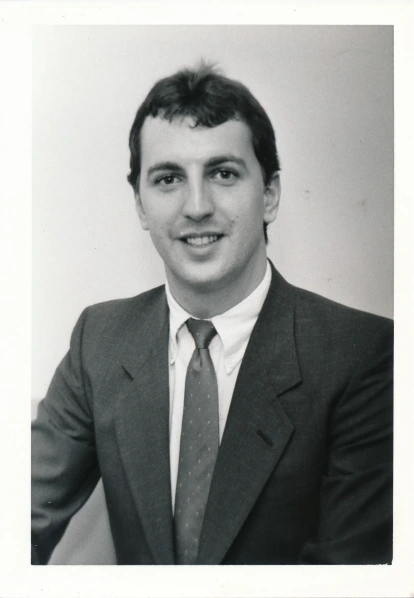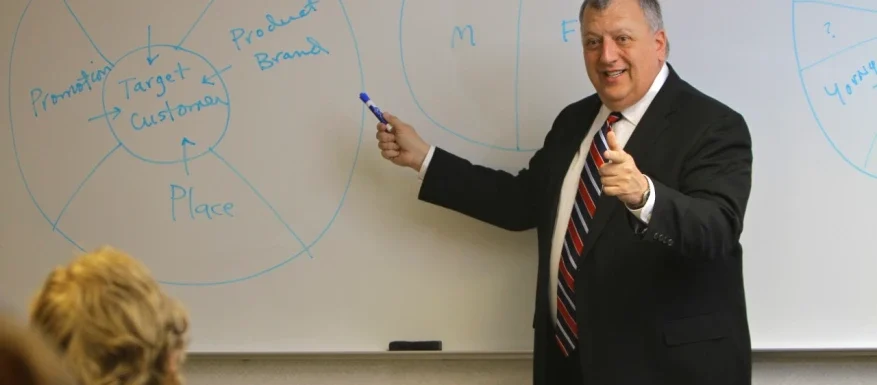By Amanda Wood Williams
It’s a warm, sunny Monday afternoon in the quiet, college town of Boiling Springs, and on the first floor of Hamrick Hall, Don Caudill is making his way toward room 119, where his undergraduate marketing management course – the capstone course for marketing majors – is about to get under way. As Caudill walks toward the classroom, he carries an unpretentious cardboard box. In the box is magic – the dynamic magic of a man dedicated to making others laugh, the unsung magic of a teacher who carries a stapler around just in case one of his students happens to need it during class, the judicious magic of a professor determined to make his course meaningful in a real-world way. Joy, caring, determination. They are in the box. Along with a myriad of cerulean, magenta and golden wrappers and bags – plastic and paper that proclaim the name brands of products like Cheetos and V8 and Campbell’s Soup. They proclaim something else, too: that knowledge is power and that education can and does make a difference.
Caudill’s Background
Don Caudill understands poverty. Born in the geographic center of the Appalachian mountains to parents who worked long hours for minimum wage, Caudill was determined – at a young age – to be the first in his family to attend college. “The only way out [of poverty] is education,” he says. “Because when you learn to do something, you can make money. You just have to be creative in how you apply your knowledge.”
Caudill is also acquainted with adversity and adept at turning negatives into positives. For example, though he enjoyed academic success in high school, in addition to working afternoons and weekends at F.W. Woolworth’s department store, as well as managing several entrepreneurial enterprises of his own, Caudill’s guidance counselor discouraged him from pursuing a college preparatory track, insisting instead that he choose a vocational calling. The counselor’s reason? The size of Caudill’s parents’ bank account. “I might not be the brightest bulb in the knife drawer, but few people can outwork me,” Caudill, who scored very high on IQ tests, says. When it became clear that the guidance counselor would try to limit him to vocational courses, Caudill developed a strategy that involved hard work, but produced the desired results. “I figured if I didn’t take any study halls, I could manage to take geometry and chemistry on top of the general business vocational classes,” he says. And he did. Successfully. In fact, Caudill says, when computers came into wide use, he already had excellent keyboarding skills – skills he learned in those vocational business courses.
This is typical Caudill style: he sees opportunity in adversity, and he is unafraid to go the extra mile to turn negative situations into successes. “I don’t know what else to do,” he says. “I enjoy work. It is a major part of my life. All work has dignity.”
Caudill attended Berea College, a liberal arts work college located south of Lexington, Kentucky. “It was the best four years of my life,” he says. At Berea, each student receives a full scholarship that covers the cost of tuition for his or her entire four years of study. Caudill was no exception, and he credits those who contributed to Berea’s scholarship fund with helping him on his journey. “I don’t believe anybody can be successful without others helping them along the way,” he says. “And that’s what I want to do for my students.”
Caudill’s Classes
After earning his undergraduate degree, Caudill went on to earn an MBA from Morehead State University, a Master of Science in marketing from the University of Memphis and a doctorate from Virginia Tech. “When I graduated from Berea College, I thought I would start my own business and try to take it public and become a billionaire,” he says. “However, when I was half-way through my MBA, I got the opportunity to teach. I fell in love with teaching at that moment.”
Caudill’s teaching strategy is simple: each class – whether online or face-to-face – should be infused with real-world knowledge and practical projects that students can apply, preferably in real-time, as they implement the strategies they’re learning to make their own businesses more successful. “If they can’t use what I teach, I feel like I failed,” Caudill says. “I get to see students create brands, advertising and promotional campaigns, and marketing surveys, open stores on paper and accomplish things that amaze me. Everything I teach is practical.”
Caudill has also made a commitment to making books affordable for his students. “I’ll never adopt a book that costs more than $100,” he says.
Caudill is especially good at engaging students in online learning. “I started teaching distance learning by satellite in the early 1990s, and as new technology is introduced, I embrace it,” he says. “I also have numerous hours of lectures taped and can use these to supplement the courses.”
But his classes are more than just opportunities to learn, as Caudill is quick to point out. “My goal is that each student will laugh at least three times,” he says. “If they don’t laugh at least three times, I haven’t done my job. My worst fear is to bore my students.” During class, Caudill shares stories, anecdotes and marketing insights that matter, and he celebrates even the smallest of successes with “Donny Awards” for outstanding achievement as phases of projects are completed. “When the students get excited about something, I do too,” he says.
Caudill’s Philosophy

Though he’s come a long way from Woolworth’s and the financial adversity of his childhood, Caudill remains modest, relying on the values he learned from his parents to guide his successes. “There’s no substitute for hard work,” he says. “And it’s good not to worry about money.” He advises students to live modestly, debt-free if possible, and to go the extra mile whenever they can. “Render more service than you’re paid to give,” he says.
In addition to hard work, Caudill values integrity. “I follow through when I give my word,” he says. “It’s the only thing you really have at the end of the day. Your integrity.”
In his free time, Caudill loves to travel to new places. “I feel fortunate to have the kind of job that allows for travel during breaks,” he says, adding that, even when traveling internationally, he’s researching marketing and marketing strategies in other countries and building his collection of product packages from all over the globe – which he uses in class to show students real-world examples of marketing concepts. Caudill, who owns more than 10,000 books, also loves to read, and likens reading to traveling. “I want to be taken places I’ve never been,” he says.
In addition to reading and traveling, Caudill loves to give – both time and resources – to help others. “The people at Berea who gave me scholarships are long gone,” he says. “But I can give somebody else a scholarship. I realized a long time ago the only thing you get to keep is what you give away,” Caudill says. “Also, I love the quote: ‘You make a living by what you get. You make a life by what you give.’”
Caudill’s philosophy of giving is something he’s been living out for 42 years, since he started tithing on his income from the four businesses he operated as a teenager. Throughout the years, as his own financial situation improved, Caudill donated money to colleges and universities across the Southeast, including Gardner-Webb. But an epiphany in 2011, which he says came softly as a result of an emergency appendectomy and a cancer diagnosis in 2022, created a new desire to give, not live, extravagantly.
“April 2011 and December 2022 changed everything. When I almost died, I realized how unimportant it was to have a lot of material things. When I came out of the surgery, I knew that God had impressed on me to give more and live on less and get rid of stuff and be content in this place where He had called me to serve,” he said, adding that his first step toward his new lifestyle in 2011 was downsizing from his custom-built home to the one-bedroom, one-bath investment home he had purchased months earlier. “I was preparing that house to rent,” he said, “and now I live there. And it’s wonderful.”
Next, Caudill decided to ramp up his giving, and by 2025 had donated nearly $1,000,000 including most to colleges and universities and in honor of his parents, Alfred and Shirley Wampler Caudill. In fact, every gift Caudill makes is given in honor of his parents, who taught him, he says, how to live. “Mother’s and Dad’s sacrifices are honored,” he said. “It’s totally about them.”
While neither of Caudill’s parents had more than an eighth-grade education, both held higher education in great esteem and made tremendous personal and financial sacrifices so that Caudill could earn a bachelor’s degree (the first in many generations of his family), two master’s degrees, and a doctorate.
“You find something that needs to be done,” he said. “And you do it. Small gifts make a difference.”
Mostly, at the end of the day, Caudill is a man of deep, personal faith who strives to make a difference. “Every success I’ve had is by the grace of God,” Caudill says, adding that a key to his success was obeying God’s guidance throughout his life. “Be willing to listen to the still inner voice of God, because it’s so accurate.” As he teaches classes, Caudill lives out his faith by focusing on inspiring students and helping them move forward in life. “Even if you only help one person,” he says. “That’s worth you being here. You can’t put any kind of price on changing a life.”
Q&A WITH DR. CAUDILL
What should a student expect from you – as a professor?
Many students comment that my lectures, projects or assignments are the most interesting of their program. Students say that my classes are challenging, but fair. In 43 years of teaching thousands of students, I’ve only had three grade appeals – one undergraduate, one MBA and one doctorate. My students will get a practical course – one that they can use. If it is a face-to-face class, my goal is that each student will “laugh” at least three times.
What can students do to prepare themselves to take one of your classes?
Nothing special. We start at the beginning in covering a topic.
Your students are known for being dedicated to volunteerism – one article about your classes states that in one semester, your students had logged more than 1,000 hours of service to 23 area non-profits. Tell us about that.
I wasn’t able to continue service learning as a “graded” component of my courses. Many graduate students have families, work full-time and had limited time to apply in a real-world “setting” (usually a non-profit organization). So, I replaced this component with a “fake” project. For instance, BADM 625 Marketing Management students “take a soft drink they create through the entire marketing management process” on paper (and on YouTube video presentations). BADM 654 Promotion Strategies students “do a comprehensive advertising campaign for a made-up soft drink. BADM 658 Pricing Strategies students price a menu of a restaurant they create (harder than it seems). BADM 695 Marketing Research students create and implement a questionnaire while BADM 695 Retail Marketing students “open” a small store on paper (and YouTube video presentations). I give what I call “Donny Awards” for outstanding achievement for each of the parts of the projects (students vote on it).
Students often worry about making “A’s” in their classes; what do you, as the professor, worry about?
I don’t want to bore students or waste their money. My goal in each class is to offer a meaningful educational experience and for there to “never be a boring moment.” Also, I want to the students to get “value” out of my classes.
What do you find most rewarding about being a professor?
The students who tell me that my courses have changed their lives for the better.



